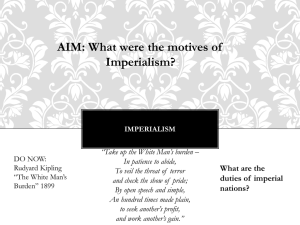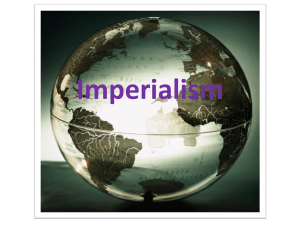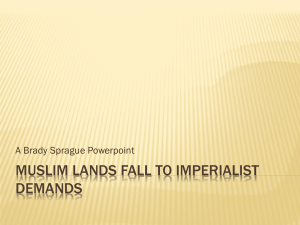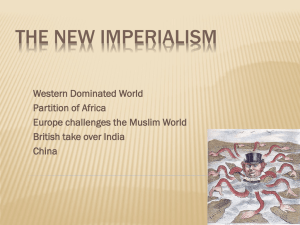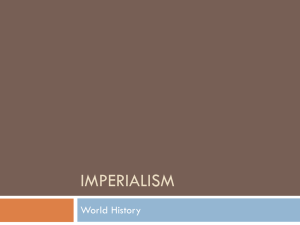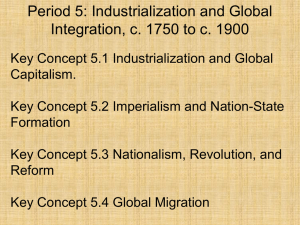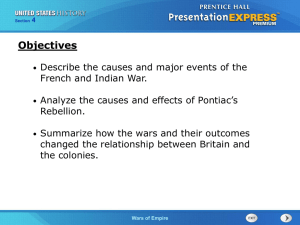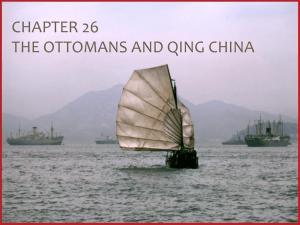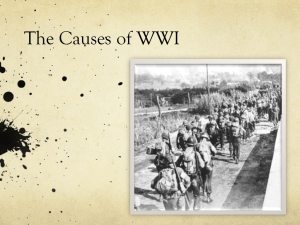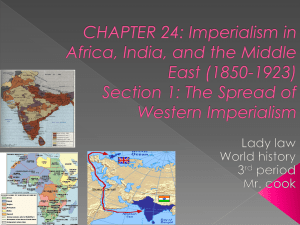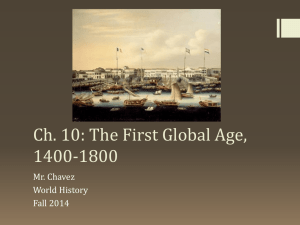Unit 9 - The New Imperialism
advertisement
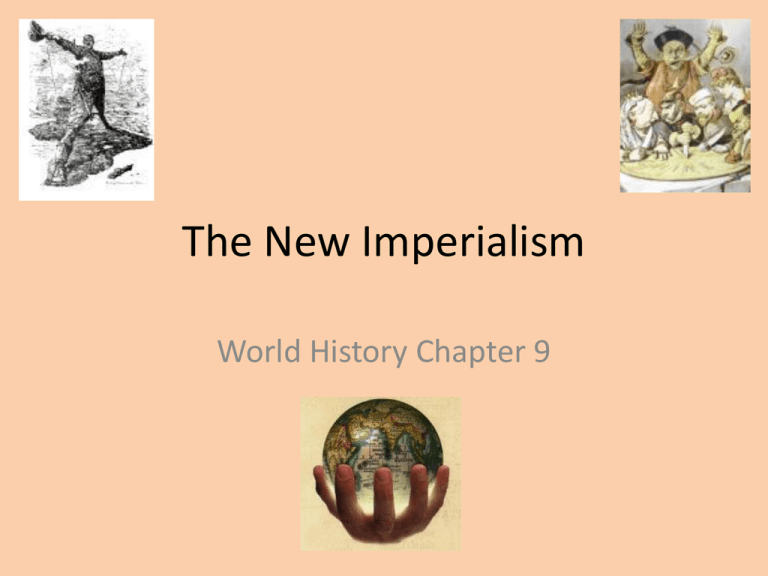
The New Imperialism World History Chapter 9 Building Overseas Empires – Imperialism is the domination by one country of the political, economic, or cultural life of another country or region. • Motives Driving the New Imperialism • From 1492, Europe dominated the Americas, but not the peoples of India, China, or Africa. By the 1800’s however, Europe was being transformed by revolution and industry, and these cultural, scientific, and economic advantages were enough to dominate the rest of the world. – Economic Interests Spur Expansion • Manufacturers needed raw materials, as well as markets for finished goods. Colonies also became an outlet for growing populations – Political and Military Motives • • Colonies provided economic power, and were therefore necessary to the strategic goals of European nations, which included political influence in Europe and around the world. Bases in the colonies provided fueling stations and strategic outposts, increasing spheres of influence – Humanitarian and Religious Goals • Many felt genuinely moved by poverty and living conditions in the colonies, and some saw this as the “white man’s burden” – Applying Social Darwinism • Growing sense of racial superiority among Europeans The Rapid Spread of Western Imperialism • Weakness of Non-Western States – While European states grew more powerful during the 1800’s, many of the older empires were in decline. – Mughal – India – Qing Dynasty in China – African Decline • Western Advantages – Strong economies – Powerful armies and navies – Superior technology • Resisting Imperialism – African and Asian nations sought to prevent western influence in their countries, and while some met success, European power was hard to resist. • Facing Criticism at Home – While most people favored having empires, there were many who didn’t. Some did not want to become involved in foreign entanglements, while other decried the exploitation of the colonies. Forms of Imperial Rule • Direct Rule – The French favored this approach, and directly administered their colonies, attempting to impose French culture on native populations • Indirect Rule – The British favored indirect rule, or rule through an existing power structure. The elite of a country were educated in Britain, and these became the rulers and administrators of the colonies. • Westernize – One of the main goals in Imperialism is to get the target country to adopt western ideals and culture, because this was seen as superior to local culture, and this also made and colonies easier to control. • Spheres of Influence – Spheres of influence amounted to having claim on an area because of economic, military, or political influence in a region. While a European country might not have control over a region, they may resent anyone else from trying to take control of the area. The Partition of Africa • Africa in the Early 1800’s – North Africa • Containing the Sahara desert and the fertile regions along the Mediterranean, this region was controlled for a long time by the then declining Ottoman Empire. – Islamic Crusades in West Africa • Islam spread into the interior of the continent, often with the result of overthrowing corrupt rulers, creating more vibrant states, and improving conditions for the general population. – East Africa • Trade flourished in these areas, mainly slaves, ivory, and copper. – Southern Africa • Expansion from South Africa soon ran into the powerful Zulu nation, and though the Zulu fought tenaciously, they could not match modern firepower. – Impact of the Slave Trade • The slave trade had a tremendous impact on African communities, weakening internal trade, and causing the general decline of African ability to withstand European imperialism. European Contact Increases • Explorers Advance into Africa’s Interior – As advances in medicine and steamboats made travel into the interior of Africa more possible, explorers et out to discover the hidden wealth of Africa. • Missionaries Follow Explorers – Much like what happened in early American exploration, missionaries went throughout Africa, to bring them Western religion and values • Livingstone Blazes a Trail – Perhaps the most famous of all explorers of Africa, Dr. David Livingstone crisscrossed Africa for 30 years, meeting many of its peoples. A Scramble for Colonies • Berlin Conference – – • Horrors in the Congo – – • From the 1830’s on, France moved aggressively to build an African empire, and largely succeeded. Britain Takes it’s Share – – • Wealthy Belgians had created a private colony in the Congo, and exploited the region in a terrible manner. Natives were treated little better than the Arawaks of Hispaniola. Treatment of the natives in this fashion caused a drastic decline in the population, and the private concerns were forced to turn over the colony to the Belgian government, where most of the abuses ended. France Extends it’s Influence – • In an attempt to avoid bloodshed in the scramble to acquire African colonies, a conference in Berlin was called, though no Africans were invited. This conference set the ground rules for seizing African colonies, including trade, and in the 20 years that followed, the European powers completely redrew the boundaries in Africa with little regard for it’s inhabitants. Britain also aggressively colonized Africa, securing areas of high population as well as strategic value, such as the Panama canal region to more easily connect to India and China. The British acquired the colony of South Africa from the Dutch in 1814, and many of the Dutch descendants (Boers) did not favor British rule and fled into the interior. When gold and diamonds were discovered on Boer lands, this set up confrontation with the British, leading to the Boer war, which featured the use of guerrilla warfare and concentration camps. Others Join the Scramble – Italy, Germany, and Portugal joined in the splitting up of Africa, each acquiring a few colonies. Africans Resist Imperialism – All of the European powers faced internal resistance to imperial rule, and these rebellions often lasted for many years. • Ethiopia Survives – An ancient Christian nation in Africa, Ethiopia survived by transforming European style, much like the Japanese. They built industry, hired Europeans to train their army, bought modern weapons, built roads, schools, and bridges. When invaded by Italy in 1896, the Italians were soundly defeated. • A New Africa Elite Emerges – Educated by the west, a new class begins to emerge in Africa, striving for national unity, as well as freedom. European Claims in Muslim Regions • Stresses in Muslim Regions • Since the 1500’s, three great Muslim Empires existed, the Ottomans (Middle East and North Africa), the Safavids (Persia), and the Mughals of India and Afghanistan. – Empires in Decline • By the 1700’s, all three empires were in decline for various reasons, though corruption, factionalism (different groups within the empire that were struggling for power, or with different agendas), and stagnation. – Rise of Reform Movements • In the late 1700’s and early 1800’s, reformers wanted to address the corruption and problems in their societies by becoming more fundamentalist in their religion (religion in government and everyday life, or Wahabi-ism). • In the Sudan, a man named Muhammed Ahmad declared himself the Mahdi (savior of the faith), and led an uprising against the British. – European Imperialism • As the power of European nations grew, they were increasingly able to dictate terms of treaties, gaining more and more control over these states. Problems for the Ottoman Empire • Nationalist Revolts Break Out – – – – • European Pressure Increases – – – • – Seeing the growth of western power, the Ottomans tried to reform, building railroads and modernizing it’s army, but the young men sent to the west to get educations returned with notions of democracy and equality. Not all wanted reform, and some sultans wanted a return to the old ways of feudalism and aristocratic power. Young Turks Demand Reform – • France takes Algeria Russia moves to take the Bosporus and the Dardanelles, Britain opposes this Germany starts to build the Berlin to Baghdad Railway Efforts to Westernize – • As ideas of nationalism spread from Europe, the Ottoman empire was increasingly beset by internal revolt. The Balkan states gain independence (Greeks, Serbs, Romanians, Bulgarians) Revolts in the middle east were put down (Arabia, Lebanon, Armenia) Egypt passes into European control (Napoleon, British) In the 1890’s a group of liberal reformers formed a movement to overthrow the government. These Young Turks succeeded in 1908, but before their reforms could be completed, war broke out in 1914. Armenian Genocide – A Christian people, long used to practicing their own religion under the sultans, were accused of attempting to help the Russians, and became the target of a genocide that would last for the next 25 years. Somewhere between 600,000 and 1.5 million were killed. Egypt Seeks to Modernize • Muhammad Ali Introduces Reforms – – • Building the Suez Canal – – • Muhammad Ali was a soldier who took advantage of the chaos after Napoleon’s disastrous invasion of Egypt to take control of the government (1805). Ali made excellent strides in reforming Egypt, modernizing the country to a great extent. Leaders after Ali were not as careful, and in efforts to build the Suez Canal, loans were taken out from European banks, which later Egypt could not repay. To pay back the loans, in 1875, Egypt’s shares of the canal were sold to the British, who took control of the canal. Becoming a British Protectorate – As nationalists began to revolt in Egypt, the British placed Egypt under it’s protection, even though it was still a part of the Ottoman Empire. Persia and the European Powers • • • Persia under the Qajar shahs (1794-1925) attempted to reform Persia, and even enacted a liberal constitution, built railroads and communication lines. However, this did not prevent the encroachment of European power into the region. Russia wanted to expand it’s southern frontier and gain access to the Persian Gulf and Indian Ocean. Britain wanted to protect it’s sphere of influence in Egypt and India. With the discovery of oil in the early 1900’s, Britain and Russia both moved troops into the region over the objections of Persian nationalists, some of whom wanted to adopt western ways, while others (Muslim religious leaders) condemned the government and western influence. The British Take Over India • East India Company and Rebellion • – Exploiting Indian Diversity • – • The B.E.I.C. ‘s main purpose was to gain profit, and to this end, improving roads, discouraging banditry, and keeping order were beneficial. The British introduced western law, education, and religion. They also banned practices such as the caste system, and Sati (upper class practice of burning the wife with the husband), and cults like the Thuggies. Growing Discontent • – India’s people used dozens of languages, and had different cultures. The British exploited this by pitting rival princes against each other, and when they could not, used direct intervention with superior arms. Implementing British Policies • – In the 1600’s the British East India Company won rights on the fringe of the Mughal empire. By the mid 1800’s, they controlled 3/5 of India. Certain practices were very insulting to the Indian’s, such as having Sepoys travel outside the country, allowing widows to remarry, and using rifle cartridges that were coated with animal fat. Rebellion and Aftermath • • In 1857, the Sepoys rebelled, massacring British and allied men, women, and children. The British crushed the revolt, and took terrible revenge, sacking many villages. As a result, parliament decided that the East India company should no longer be in control, and took India directly into the British Empire. Impact of British Colonial Rule • An Unequal Partnership – Under the direct rule of the crown, the British Raj (king) also known as the Viceroy, ruled in the name of the queen. – As India as both source of raw materials as well as a huge market, the British built an impressive rail network and excellent roads. – The British kept direct control, with most position in the government held by British nationals, and British goods destroyed local businesses. • Population Growth and Famine – Much of the farmland of India was turned over for the production of cash crops like cotton and jute, which later became a problem when population growth from better living conditions increased the population tremendously. As a result, terrible famines swept through India. • Benefits of British Rule – There were some benefits from British rule, one of them being a rough peace. Where before the Muslim Mughal rulers were harsh to the Hindi, the British treated everyone equally, landowners grew rich, and the upper class benefitted from British educations. Different Views on Culture • Indian Attitudes – In the early 1800’s, Ram Mohun Roy combined western and eastern principles in education. Roy set up schools in Calcutta which spread throughout India. While Roy was a champion of Indian culture, he condemned some traditions such as sati, caste, child marriage, and purdah (isolation of women). He is later credited as being the founder of Indian nationalism. • Western Attitudes – Some respected the ancient cultures in India, adopting portions of Hinduism and Buddhism in western philosophy, while others denigrated the culture as having nothing worthwhile to the west. Indian Nationalism Grows • Indian National Congress – He practice of sending upper class Indian children to British schools was believed to bolster British control of India, but it eventually had the opposite effect of teaching students about democracy and self rule. – In 1885 nationalist leaders organized a Congress, using peaceful demonstrations they hoped would bring about home rule. • Muslim League – Muslims, fearing that a Hindu led government would oppress them, started a Muslim League to pursue their own goals, hoping to create a separate Muslim state. China and the New Imperialism • Trade Between Britain and China • • – The Opium War (1839) • • • – In the late 1700’s, the British East India Company found the trade arrangements with China to be much less profitable than they could be, and tried to find ways around the trade barriers erected by China. The answer for the British was the cultivation and sale of opium. Soon, many Chinese were addicted to the drug, and the British were making enormous profits, disrupting the Chinese economy. Chinese officials outlawed the drug, executed drug dealers, and when the British did not stop the trade, Chinese warships opened fire on the British traders. This action prompted swift reply from British gunships with the latest in weapons, bombarding coastal towns until the Chinese capitulated. Unequal Treaties • • • Since the 1600’s, strict Chinese regulations kept European traders restricted to a small trading enclave, where Europeans could buy silks, teas, and porcelain in exchange for gold or silver. This arrangement provided a trade surplus to China, but a trade deficit to the Europeans. This would change as European power increased, and China slides into a decline. In 1842, China was forced to sign the Treaty of Nanjing, paying indemnities to the British, allowing the lease of Hong Kong, opening ports to foreign trade, and allowing British citizens extraterritoriality, or the right to live under the laws of their own country and be tried in their own courts. Another war in 1856 to 1858 ended with Russia, France and the United States forcing China to open even more ports, and allow Christian missionaries into the country. The Taiping Rebellion Weakens China – Even as western powers were harassing China, government corruption, mismanagement, and repression had started a peasant rebellion that lasted from 1850 to 1864. Though the rebels were defeated, casualties were somewhere between 20 to 30 million Chinese. Launching Reform Efforts • Self-Strengthening Movement – • War with Japan – • While China remained lukewarm to progress, Japan leapt ahead, and in 1894, the Sino-Japanese war ended in China being humiliated by it’s ancient rival, and the surrender of the Island of Taiwan. Carving Spheres of Influence – • In the 1860’s, reformers started to modernize China by starting industries, importing western technology, setting up railroads, ports, mining and light industry, but this movement did little to address the gap that had grown between China and the West because the government was not really behind the changes. With China’s weakness exposed, European powers started to carve up China for their own benefit. The United States did not take part in this, but did call for trade to remain open to all, the Open Door Policy. Hundred Days of Reform – In response to these defeats, a young new emperor, Guang Xu launched the hundred days of reform, affecting the whole government and encourage industry. Conservatives rebelled against this, and overthrew the government. The Qing Dynasty Falls • Boxer Uprising – Alarmed by the growing number and power of foreigners in China, Chinese martial artists started a society to rid the land of foreign devils, the Righteous Harmonious Fists. – Known as the Boxer Rebellion, this uprising triggered a coalition force of Western powers and Japanese to suppress the rebellion. • Aftermath of the Uprising – More concessions were made to the foreigners, and now, even the conservatives understood the need to modernize. • Three Principles of the People – Though the Boxer Rebellion failed, feelings of nationalism grew. One reformer called for a republic founded on three principles: Nationalism, Democracy, Economic Security. • Birth of the Republic – When the empress died in 1908, and a two year old was put on the throne, China descended into chaos. Rival warlords attempted to seize control of the government, or who carved out areas for themselves. Other tried to set up a republic, led by Sun Yixian.
